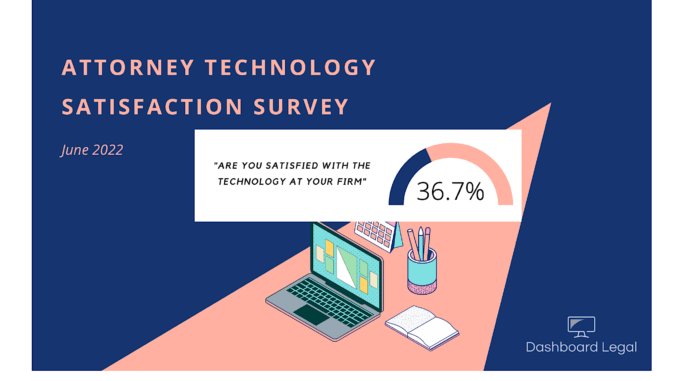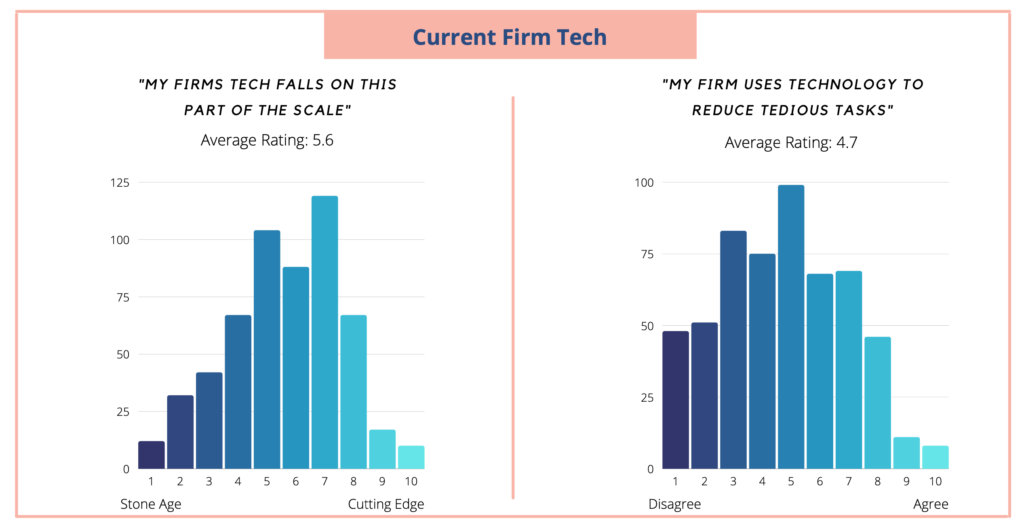
A new survey has found that only 36.7% of lawyers are satisfied with the tech tools on offer at their firms, and with only 37.1% saying that they had used a new product at their law firm in the last six months. So, they’re not too happy with what they’ve got, while most firms are not bringing in anything much that is new either.
The sample of 560 lawyers, mostly associates but including some partners, showed that overall there was a general feeling of being underwhelmed with what law firms had bought for their fee-earners – or at least had implemented and made available to them.
On a 1 to 10 scale, the lawyers gave the level of current tech development at their firms an average score of 5.6, where 1 was ‘Stone Age’ and 10 was ‘Cutting Edge’.

Using the same 1 to 10 scale, lawyers suggested that their firms were not that focused on using tech to help reduce tedious work, with a score of 4.7. Firms were also seen as not really using tech to improve their profits.
And when asked directly if their firms used tech specifically to ‘prioritize my happiness’ the score was 3.4 – i.e. a fairly strong ‘no’.
While the last one is not surprising, that the sample was so underwhelmed by what their firms had available is a reflection that despite tons of tech tools in the market, many firms were just sticking with whatever they had at hand and are not really pushing for newer products that might help to reduce process work via automation of certain tasks. (And it’s worth noting that around 45% of the firms involved were over 500 lawyers – so not tiny shops that could not afford new tech.)
Interestingly, when asked their views about contract automation tools at their firms, around 60% said ‘they don’t have any’, while for collaboration software 35% said they didn’t use any.
That shows that even though doc automation is one of the most developed legal tech tools in the market – and with literally dozens of providers – a majority of the sample didn’t even have it, or if they had it hidden away in their tech stack they were not being asked to use it and so were not aware of its existence at the firm.
Mat Rotenberg, CEO of Dashboard Legal, the company that conducted the survey, told Artificial Lawyer that a key factor here is the retention of talent, i.e. that underinvesting in tech that removed drudgery would inevitably contribute to lawyer attrition.
‘This survey raises the question of whether firms are doing what they can to retain top talent. It appears that partners are not asking associates what they want to make their lives better.’
He noted that the survey data also showed that although lawyers were not that pleased with what was on offer, they did indeed value tech solutions and believed they could help.
Rotenberg said that one of the most direct ways to help solve the problem here is to address issues such as lawyers getting trapped in their email inboxes, which slows them down, makes them spend too much time just searching for information, and makes collaboration difficult because information is trapped inside emails, rather than being readily available such as via a dashboard.
(And in a prior article – the company showed that ‘lawyers spend 66% of their day working with emails’, so it’s clearly an issue.)
Now, Dashboard Legal is a workflow and collaboration platform, and is especially aimed at getting lawyers out of the email whirlpool, but Rotenberg does make a fair point. If you look at where lawyers are bogged down (i.e. stuck in their email inboxes as they try to work on a deal) then solving that would reduce friction and make it easier to get on with the job.
It may be just one part of the ‘legal production line’, this site would say, but it’s as important as other sections of the line that might include using NLP tools for doc review or redlining, for example.
I.e. we need to address the entire legal production line, from where information first comes into the system, all the way through to the sending of the end product to the client.
‘The reality is that a lot of lawyer time is spent just searching for information in emails,’ Rotenberg said, and added that if you had ‘better access to richer data’ lawyers would see a notable improvement in their working lives.
This site then asked that if law firms experienced a downturn in the months ahead might they feel it was not so important to meet the needs of their lawyers? Rotenberg replied that even in a relative slowdown firms still needed to keep their top talent as they are the future of the firm.
This site would add that in a slowdown, not wasting your lawyers’ time on low value work is also going to be critical to profitability.
I.e. if you are feeling a squeeze, then burying your fee-earners in work that is either unbillable or low rate, and that may also slow down deals which reduces the firm’s total through-put of matters, means you will gain less income for the firm overall. So, there is a double reason to make sure your tech stack is keeping pace with needs.
Overall, this is useful data that underlines that although a growing number of firms are on the ball and are very focused on driving tech implementation, (and removing bottlenecks in their legal production lines which in turn may improve lawyer satisfaction and support profits), many equally are not, and appear – in this survey – to be just coasting along.
You can find the full survey results and report here.